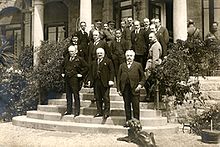Genoa Conference

The Genoa Conference was held from 10 April to 19 May 1922 in Genoa instead. 34 countries took part in it, with the exception of the USA, all participants in the First World War . The conference dealt with the restoration of the international financial and economic systems that had been shattered by the war. It was preceded by the Cannes conference in January of the same year, the occasion of which was the declaration by the German Reich that it would not be able to fulfill the reparations imposed on it.
negotiations
The desired reorganization of the international financial system should be achieved through a partial return to the gold standard . This had been given up during the war in order to finance the war expenditures by expanding the money supply by printing banknotes - but this with all the negative effects of the resulting inflation . In order to stabilize the exchange of money and commodities again, the agreements of the Genoa conference achieved a gold standard for currencies in which the gold reserves remained largely untouched. This "interwar gold standard" allowed banknotes to be exchanged for precious metal, but not for coins, but only for large bars ( bullionism ). These were not suitable for daily payment transactions, so that the majority took place in banknotes.
There were also negotiations on ways and means of rebuilding the economies of Central and Eastern Europe, which had been shattered by the First World War. Last but not least, the relationship between the capitalist states and the Russian Socialist Federative Soviet Republic with its communist social and economic system, which was established after the end of the Russian civil war , should also be negotiated.
The negotiations were made considerably more difficult by the widely divergent goals of the participating states. Great Britain, whose initiative the conference was born, turned its interest primarily to European economic relations. After the French Prime Minister Aristide Briand resigned on January 22, 1922 and Raymond Poincaré took his place, the French delegation replaced a general European rapprochement policy with a clear emphasis on national interests. Renegotiations on the German reparations and the waiver of reparations for civilian losses were strictly rejected, which ran counter to the intentions of Germany and Russia. The German Reich, whose goods were subject to a boycott by the Western powers , hoped for an economic restart as well as easing the reparations issue. For its part, the Russian Socialist Federative Soviet Republic strove not only for diplomatic recognition but also for the cancellation of the debts of Tsarist Russia and economic ties with the western industrialized countries without having to join a closed capitalist system. The RSFSR tried to deny its identity with the tsarist empire and thus also its liability for its debts, since the tsarist empire fell through the February revolution of 1917 , but this was rejected by the other powers. The exclusion of reparations from the negotiation agenda induced the USA, which waived reparations themselves, not to participate in the conference.
Rapallo Treaty
The Genoa Conference was the first major financial and economic conference after the First World War, in which the victorious powers, the German Reich and the Russian Soviet Federal Socialist Republic also took part. The two most important states that were ostracized at the time (Germany as the main culprit in the war according to the Versailles peace , Russia as the main threat to the prevailing liberal-capitalist world order) were again more closely involved in international politics. For Russia in particular, participation practically meant diplomatic recognition of its revolutionary government.
On April 16, on the sidelines of the Genoa Conference, the German Reich and the Russian SFSR surprisingly signed the Rapallo Treaty . The treaty normalized the relations of the two states, which wanted to break up their extensive international isolation with it, and was intended to strengthen their negotiating position with the Western powers.
literature
- Carole Fink: The Genoa Conference: European Diplomacy, 1921-1922. Syracuse University Press, 1993. ISBN 0-8156-2603-7 .